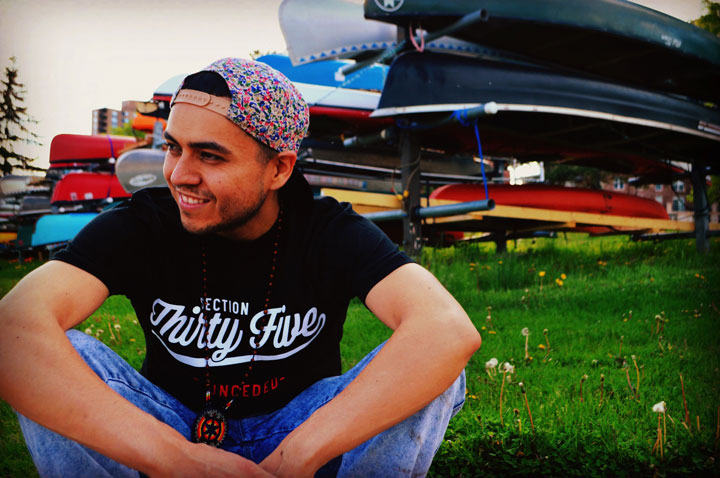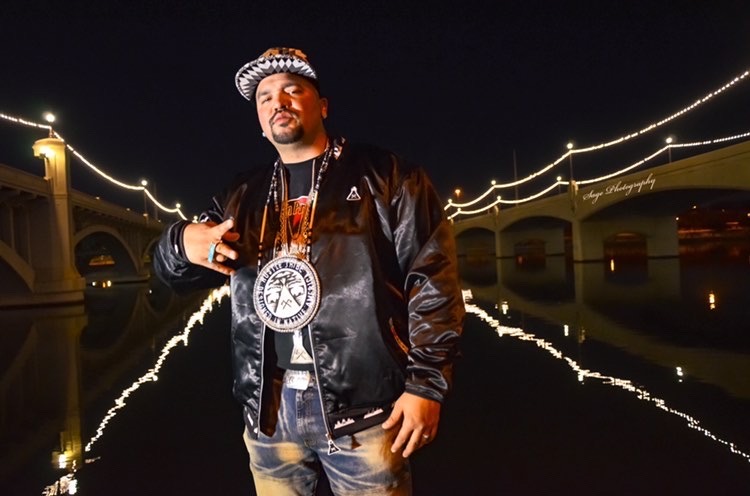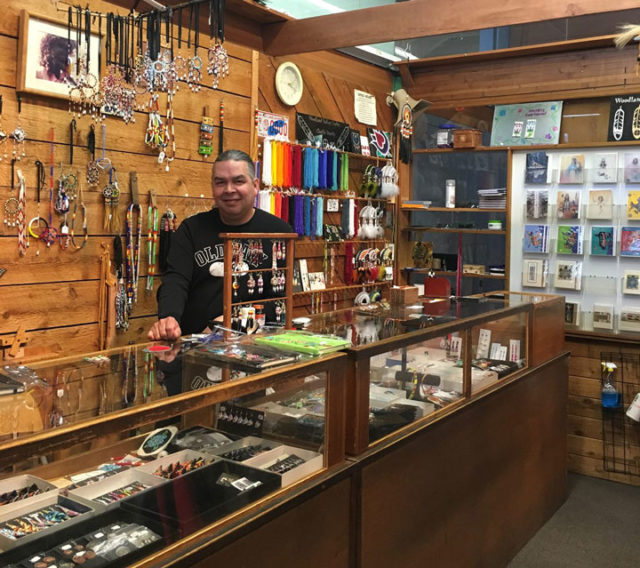By Hannah Broadbent
On a regular day Rafael (Rafa) Gonzalez, also known Hip-Hop artist Tufawon, wakes up in his South Minneapolis home and heads to work. The Native (Dakota) and Puerto Rican artist teaches Audio Production 5-days a week at the Folwell School of Performing Arts in South Minneapolis.
On a more relaxed day when he’s not gigging at the Franklin Library after work, speaking at a public event, or serving at Cafe Racer Kitchen in the Seward neighborhood, he’ll head to his mother’s house.
Coffee in hand, Gonzalez will visit his mom while she beads her latest project – the perfect afternoon. If the mood is right and depending on the day, he’ll head over the YMCA or play basketball at the Minneapolis American Indian Center. One thing is for sure, no matter what day it is, it’s not over until he spends hours in his recently finished home studio making music.
This used to be “a day in the life” when schools and libraries were open, when community centers were still able to welcome the community inside, and meals could be eaten in gathering spaces. With the Covid-19 pandemic shutting things down, the only thing that is certain for Gonzalez is his music.
Like all dedicated artists, Gonzalez has spent the last several years completely dedicated to his work. He’s been working on promotion, going on European tours, learning more about music production and with the completion of his studio, it was time to start focusing on the music again.

“As an artist, I have to perform my music. After all, being on stage is my favorite part of the process. That part is pretty much gone, well, completely gone.” Gonzalez said. “It’s these seasons, spring and summer. Concerts, outdoor festivals, gatherings – all those things should be happening and I was excited to be a part of it.”
Gonzalez isn’t the only person whose life has been forced to a sudden stop. According to CNN, 16% of Americans are suffering from layoffs, furloughs or reduced hours. Over the last five weeks, 26.6 million adults have filed for unemployment, all due to the Covid-19 pandemic.
For the businesses that have not shut down in non-Indigenous communities there are somewhat simple solutions to supporting them. Take out meals, online shopping or large bailouts. But what about our Indigenous small businesses?
Music, speaking and teaching were all forms of income for Gonzalez. Those are gone now but he still has the ability to sell his music digitally. The more he can promote himself, the more people will engage and listen to his music via online streaming services.
“I immediately started thinking of alternatives,” he said. “This quarantine pushed me to be more resilient in the ways I work as an artist and to be more flexible. I realized that the online and social media marketing of myself as an artist had to be dialed all the way up.”
His resilience as a Native, Minnesotan artist was not unmatched. Chase Manhattan, an Ojibwe and Lakota hip-hop artist and businessman is attacking every new day with a fighting attitude. He has been doing music since 2007 and has been thriving with his clothing company, Hustle Tribe, since 2013. Hustle Tribe relies almost exclusively on powwows and other community gatherings for business.
“My whole year for 2020 has been planned since December,” Manhattan said.

Manhattan remembers driving back from the San Carlos Powwow in March when the fear of Covid-19 hit him. By the time he got home, it was all too real. “I was in four or five days of really deep uncertainty. I was spending every moment trying to think of what to do.”
Manhattan would be attending every major powwow, basketball tournament and event across the country for the rest of the year. Since March, he has lost at least 10 events. Though, like Gonzalez, the question was never “if” it always remained “how”.
Manhattan and Gonzalez both turned to the internet – Facebook and Instagram – as possibly, their only options.
Having similar businesses strategies they both started almost daily liveshows on social media, the goal is to connect with their communities any way possible. Manhattan does daily sticker giveaways and Gonzalez promotes his live shows like he would a regular concert, making fliers and having set days and times for each.
But what about the many traditional artists who rely on the face-to-face business they’ve had for decades?
Charlie Stately (Red Lake Ojibwe) has owned Woodlands Crafts Gift Shop inside the Indian Center since 1980. His day to day was simple, working with customers in his shop to get them what they need for their projects while simultaneously beading a pair of earrings he’d be selling next. Depending on the week, he may be getting ready to head to a powwow that weekend. In the summer, that would be almost every weekend.
Aside from making his traditional bead and leather work, Stately would try to be available to his community every day of the week to answer their questions or even teach them. He says since the Center has closed, that has stopped too.
“I thought shelter-in-place would be a couple weeks.” Stately said. “It’s been very difficult, I’m used to opening the shop, working everyday and weekends too. A lot of people have felt the financial strain of being closed for this time.”
All three artists are anxiously awaiting the coming months. Manhattan is keeping his eyes and ears open for July and August powwows that have not been cancelled yet. Stately is eagerly awaiting the reopening of the Indian Center, saying he would go back to work today if he could.
Stately has also been slowly making the move to social media, posting earrings here and there on the Woodland Indian Crafts Gift Shop Facebook page. He says he is working on online shops, but would really prefer to go back to his beloved shop.
Something all three of them can agree on though, is that this time has given them the ability to focus on themselves and make new art.
Gonzalez is dropping his latest album around early July. He says the project is definitely influenced by our “new normal” and there is already a song written specifically about this experience and what it has shown us about our world.
Manhattan said this is the most time he has had for himself in a long time. He’s been working on his music as well, also finishing projects in the studio. As for Hustle Tribe, he just put new designs on the website and says there will be more new designs coming soon.
Stately is also loving the ample time for creating, he says he’s been working on new projects and trying new techniques he hasn’t had time for. “They’re turning out pretty great. I am happy to create, I have new ideas all the time,” Stately said.
They all agree it can be tough supporting artists at this time, but it can be done and it needs to be done. Manhattan believes that with the influx of online marketing, especially with indigenous art, it’s time to choose our small businesses and give back. Tuning in to live shows, buying online or promising to show up when it’s over, these artists are just a few of many that have made their place in the most sacred parts of our culture.
“Indigenous artists preserve our culture,” Manhattan said. “We’ve always traded, we’ve always worked together. This is our economy and we have to preserve indigenous culture with our artists.”







